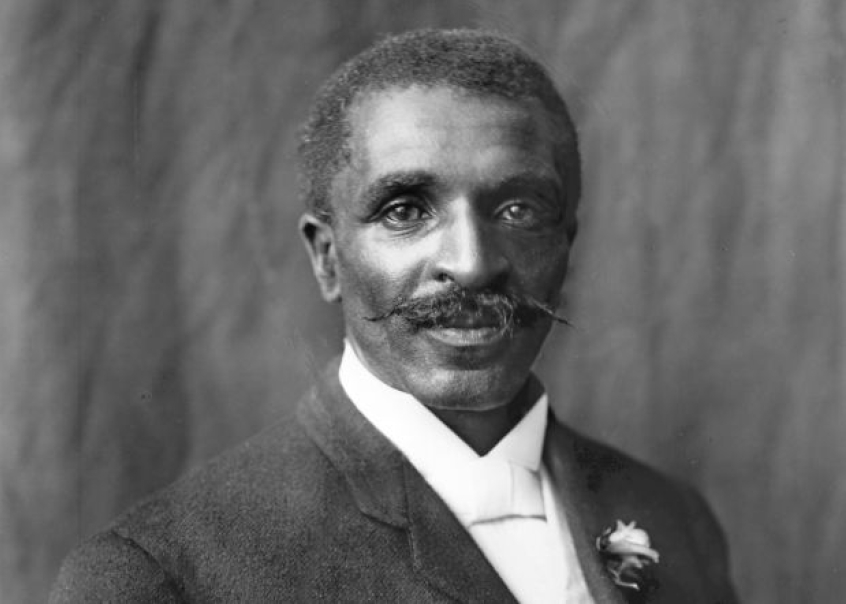
On this date in 1943, the great scientist, botanist, inventor and Christian George Washington Carver died at the age of 78.
Born into slavery in Diamond, Missouri during the Civil War in around 1864, Carver is perhaps best known for devising over 100 products including dyes, plastics and gasoline using one major crop: the peanut.
But his Christianity was a key part of Carver, who insisted that faith and science were complementary, not incompatible.
Carver came to faith when he was a young boy, and a letter he wrote later is worth printing in full as it is so illuminating about his upbringing:
"I was just a mere boy when converted, hardly 10 years old. There isn't much of a story to it. God just came into my heart one afternoon while I was alone in the 'loft' of our big barn while I was shelling corn to carry to the mill to be ground into meal. A dear little white boy, one of our neighbours, about my age came by one Saturday morning, and in talking and playing he told me he was going to Sunday school tomorrow morning. I was eager to know what a Sunday school was. He said they sang hymns and prayed. I asked him what prayer was and what they said. I do not remember what he said; only remember that as soon as he left I climbed up into the 'loft,' knelt down by the barrel of corn and prayed as best I could. I do not remember what I said. I only recall that I felt so good that I prayed several times before I quit.
"My brother and myself were the only colored children in that neighbourhood and of course, we could not go to church or Sunday school, or school of any kind. That was my simple conversion, and I have tried to keep the faith."
— Letter to Isabelle Coleman; July 24, 1931
Due to ill-health, Carver was not expected to live beyond 21. When he did, his faith deepened and he befriended Christians throughout his life who helped Carver defend himself against attacks in the media over his scientific methods.
As a young man, Carver eventually attended a series of colleges before receiving his diploma at Minneapolis High School in Minneapolis, Kansas. But accepted to Highland College in Kansas, Carver was again denied admittance once college administrators learned of his race.
As well as science, Carver was interested in the arts, and his skills in drawing the natural world prompted a teacher to suggest that Carver enrol in the botany program at the Iowa State Agricultural College.
Carver began his botanical studies the following year as the first black student at Iowa State, excelling and establishing himself as an exceptional botanist in the coming years.
His major break came when Booker T Washington, the principal of the African-American Tuskegee Institute, hired Carver to run the school's agricultural department in 1896.
Tuskegee's agricultural department achieved national renown under Carver's leadership, especially when it came to methods of crop rotation and the development of alternative cash crops for farmers in areas heavily planted with cotton, helping struggling share-croppers – many of them former slaves - in the South.
Carver rose to national prominence and used his celebrity status to write a national newspaper column and tour the nation speaking about science, his achievements and the possibilities for racial harmony in the United States; between 1923 to 1933, Carver toured white Southern colleges for the Commission on Interracial Cooperation.
A campaign to erect a national monument in Carver's honour also began before his death. Harry S Truman, then a senator from Missouri, sponsored a bill in favour of a monument during World War II, a monument which – it was believed – would encourage African-Americans to enlist in the military; the bill passed unanimously in both houses.
In 1943, President Franklin D Roosevelt dedicated $30,000 for first national monument dedicated to an African-American – Carver - west of Diamond, Missouri, the site of the plantation where Carver lived as a child.
In 1948 and 1998, Carver appeared on US commemorative postal stamps as well as a commemorative half dollar coin minted between 1951 and 1954.
A number of schools are named after him, as are two US military vessels.
In 2005, the George Washington Carver garden was opened in Missouri Botanical Garden, St Louis, in which there is a life-size statue of the garden's namesake.
But away from the – justified – celebrity, it was his Christian faith that remained central to Carver's life. He once compiled a list of eight cardinal virtues for his students to strive toward, which sum up his own approach to life:
- Be clean both inside and out.
- Neither look up to the rich nor down on the poor.
- Lose, if need be, without squealing.
- Win without bragging.
- Always be considerate of women, children, and older people.
- Be too brave to lie.
- Be too generous to cheat.
- Take your share of the world and let others take theirs.













